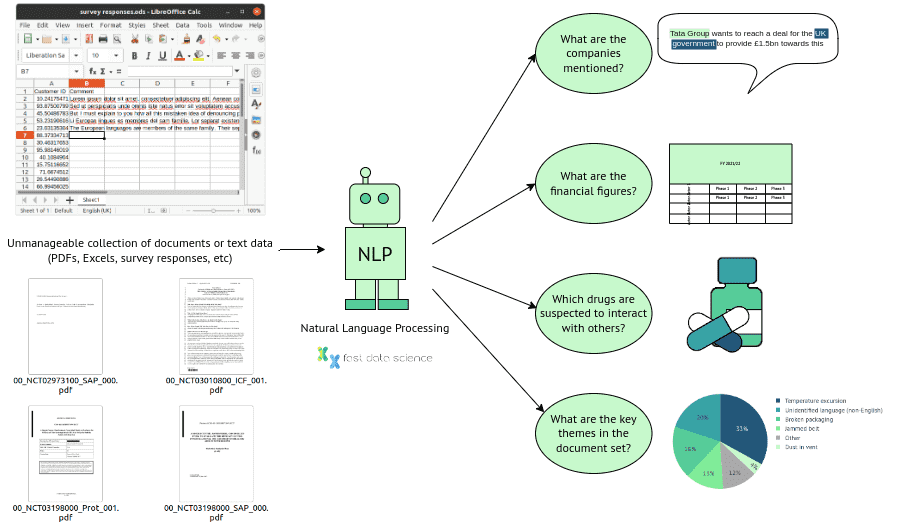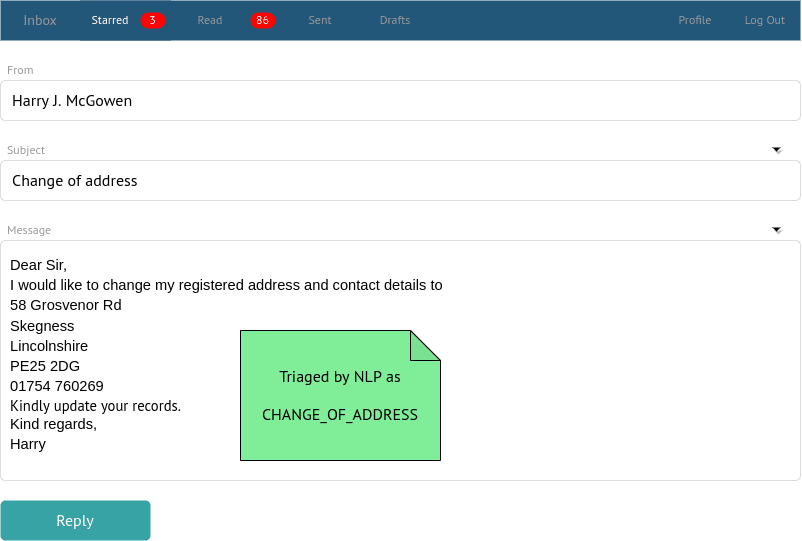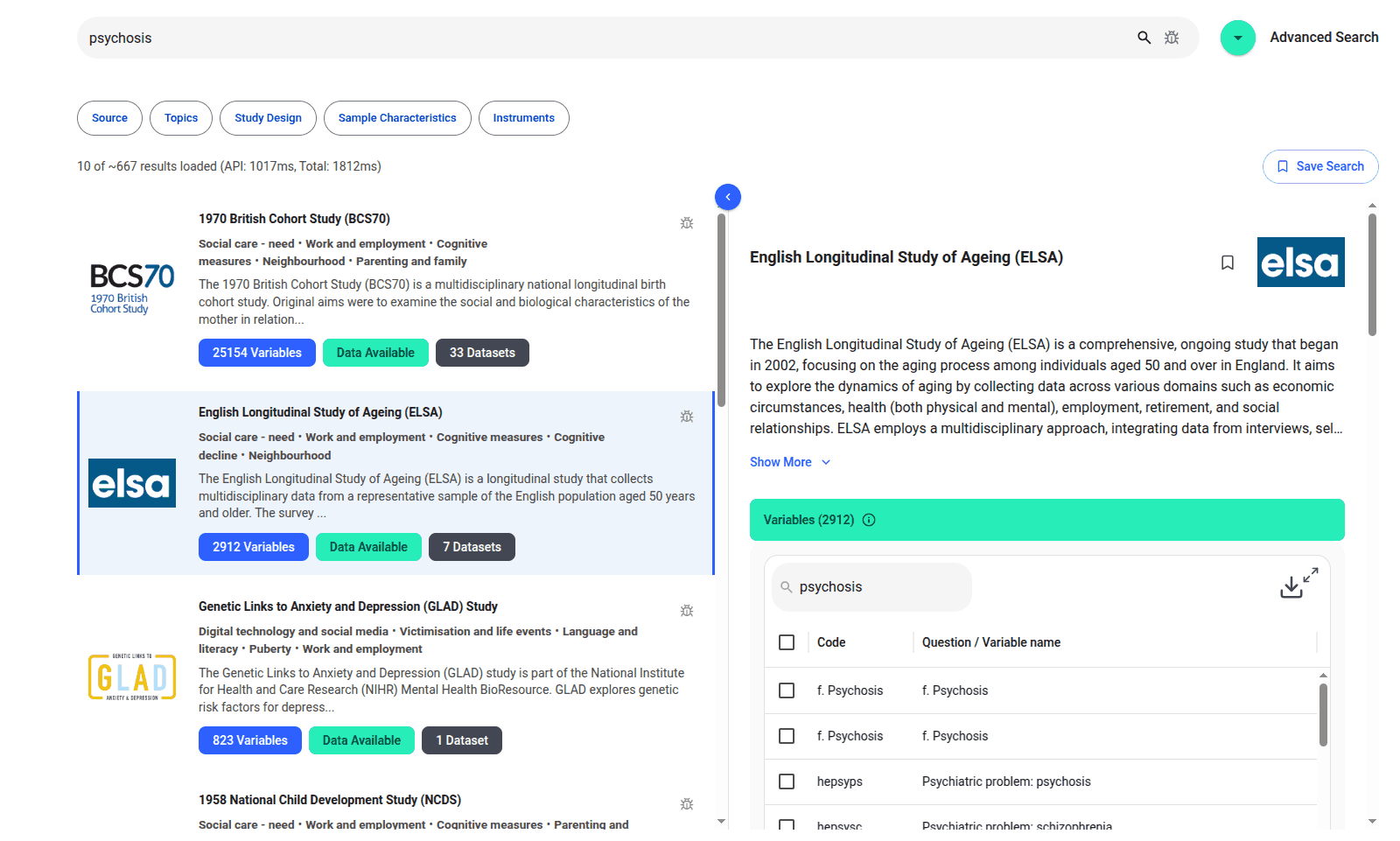
Before we answer one of the most commonly searched questions on Google – “What is an NLP expert?” – we ought to understand what NLP is.
NLP solves a rather common business problem: making sense of unstructured data.
Each day, over 2.5 quintillion bytes of data is generated worldwide; however, only 10-20% of this data is machine readable. The rest, almost 90%, is unstructured and, hence, unusable data. So, we’re talking about unusable language data within audio and video, email, PDFs, social media, image files and chatbots, for example.
Where NLP comes in, and more specifically, the expertise of an NLP specialist, is to help machines make sense of unstructured data. Why is this important? Well, once machines know how to make sense of unstructured data, that very same data can be optimised at scale, thus, helping businesses extract meaningful insights which can then be transformed into business intelligence.
With so much business potential, it’s unsurprising to see that at least 33% of tech leaders have increased their NLP budgets by 30% or more. In fact, 15% tech leaders have doubled their budget.
Businesses must understand that NLP is part of a much broader digitisation strategy – it helps machines make sense of unstructured data through advanced and often complex language analysis as well a processing.
So, NLP essentially solves the unstructured data problem, with the role of an NLP specialist becoming all the more critical.

An NLP expert assists companies in extracting key information from unstructured text data.
NLP specialists or more appropriately, NLP engineers, are responsible for building and maintaining NLP systems. The systems are effectively used to analyse human language to extract meaning, determine intent, or perform other tasks.
Some NLP specialists are involved in the development of AI systems which can reason about language the same way humans do.
NLP experts typically work closely with software developers and computer programmers to come up with such systems. They have strong technical skills in the areas of data analysis, computer programming, database management and more.
Have you ever wondered how Alexa or Google can understand what you’re telling them? Well, that would be the work of an NLP specialist.
So, as you can see, NLP experts are the people behind the complex programming which fuels technology’s ability to process and analyse natural language data. It’s initially, unstructured data, but an NLP specialist helps machines to make sense of that data and essentially translate it into something meaningful – such as people asking Google or Alexa something, and then getting the desired answer!
This brings some very interesting use cases into play, so any business stands to gain a lot by investing in the expertise of an NLP expert. We’ll be discussing those use cases shortly so make sure you read till the end!
In a generally broad sense, an NLP expert’s responsibilities may include:
The above is just to give you a general idea of what an NLP expert does on a day-to-day basis or how businesses might benefit from their expertise. The key responsibilities of an NLP engineer may differ based on the type of business they work for or the industry they are in.
With that said, an NLP expert is generally involved with the design and development of language-understanding systems as well as the effective use of text representation methods. This may entail dealing with AI speech recognition, speech patterns, natural language generation, and understanding of natural languages.
Furthermore, NLP specialists may also be required to work on scripts for analysing and processing textual data, while also measuring how accurate the language understanding is.
A typical expert in the field of NLP will have the following skills:
NLP experts may work in a variety of day-to-day business settings – offices, manufacturing plants or research labs, for instance. They might work for companies that are tasked with developing and marketing NLP software or for businesses which are engaged in using such kind of software to develop bespoke applications. You might even come across NLP specialists working in academic institutions or government agencies, helping them refine their processes.
Natural language processing or simply NLP is the driving force behind machine intelligence in several modern real-world use cases. An expert NLP specialist can use the power of machine intelligence and other cutting-edge technologies to help solve many business problems and come up with innovative solutions, including but not limited to:
To most businesses, the thought of NLP rarely comes to mind as a ‘solution’ when it comes to early spam detection. However, the newest spam detection technologies all have NLP’s text classification abilities at the core, in order to scan emails for language that, in fact, mostly indicates a spam or fishing attempt. This has proven to be extremely valuable to businesses as cyber attackers continue to mount their efforts with ever more sophisticated attacks through phishing and spamming.
The indicators in NLP’s text classification abilities may include the overuse of certain financial terms or threatening language, for example, or characteristic bad grammar, misspelled names of companies and/or individuals, an inappropriate or confusing sense of urgency, and a lot more.
NLP has now become a critical tool for discovering hidden data insights through social media channels. For instance, sentiment analysis helps to analyse language used in social posts, reviews, responses and more, to extract customer emotions and attitudes toward specific products, events and promotions – informing companies on how to come up with better product designs, for example, or optimise their advertising campaigns, and more.
Virtual agents like Amazon’s Alexa and Apple’s Siri use speech recognition to understand the underlying patterns in voice commands and natural language generation. This helps them respond with helpful comments or the desired action. Chatbots perform similarly when users key-in text entries.
The best of both chatbots and virtual agents actually learn to recognise contextual clues about user requests and use them to respond even better over time, possibly with more varied options.
An advancement in the field of chatbots and virtual agents is the ability for these applications to perform in question answering – that is, the ability to respond to user questions, whether they are anticipated or not, providing relevant and helpful answers in their very own words – just like a real human would when asked something.
In 2022 and 2023, chatbots experienced a huge surge in interest with the advent of large language models (LLMs) such as GPT-3, Google BARD, and others. LLMs can be extended with plugins and prompt engineering and repurposed for a variety of use cases.
You can try Fast Data Science’s chatbot at the bottom right of the page, which is based around OpenAI’s GPT-3.5 with some added prompt engineering. We also have a chatbot demo which answers insolvency questions. Both of these chatbots use off-the-shelf LLMs with additional domain knowledge added in.
And in case you’re wondering how generative models can be evaluated and quality controlled, you might want to check out our blog post on evaluating generative language models.
If you have a business problem and believe this could be solved with a chatbot or LLM, don’t hesitate to get in touch and arrange a consultation with Fast Data Science.
Text summarisation uses NLP methods at the core to digest vast amounts of digital text, creating summaries and synopses for research databases, indexes or busy readers who can’t seem to find the time to read the complete text. This may prove to be very useful for, lawyers, for instance, who must sift through multiple case histories to solve an ongoing case.
The most advanced text summarisation applications use natural language generation (NLG) and semantic reasoning to add highly useful context and conclusions to summaries, ultimately helping people find the desired data from huge volumes of text – think of it like finding a needle in a haystack, only that in this case, NLP quickly helps you find that needle!
Google Translate is perhaps one of the most common examples of NLP technology at work. Machine translation that’s truly useful has to do with more than simply replacing words in one language with the words of another.
Effective translation must, therefore, capture the meaning and tone of the input language very accurately, translating it to text, but with the very same meaning and desired impact in the output language.
As NLP experts gain more mastery over the current limits of what natural language processing can and cannot do, machine translation tools continue to make solid progress as far as accuracy goes.
When leveraged successfully in the hands of an NLP expert, there are many ways NLP can make a positive impact in multiple areas of business, such as process accuracy, speed to market and employee capacity. Here are multiple use cases of NLP automating document processing:
Clinical documentation – NLP can potentially enhance patient quality care through the clinical documentation automation of EHR and EMR systems, or clinical trial protocols or KOL insights. With NLP at the heart, clinicians can use voice recognition software to record notes as well as use digital assistants to streamline the digital data being fed into EMR systems – thus, making it easy to retrieve that data at the point of care for clinical decision-making purposes.
This will certainly help clinicians spend less time going through clinical documentation and more quality time on actually engaging with patients.
Let us know if you have a set of clinical documents and would require help to analyse them.
Chatbot for customer service – As briefly touched upon in a previous use case example, chatbots using NLP bring a new generation of virtual agents, with the ability to process customer queries quickly and guide them to the appropriate answer or resolution – all with zero human intervention. However, if the queries prove to be complex beyond a chatbot’s capacity, a human agent can always intervene and continue the conversation.
This can help to reduce an entire bottleneck of frequently occurring issues related to customer service, while also gathering critical data to facilitate better live conversations in future.
Email classification – On average, about 10% of employee time is spent monitoring emails. The key thing to do here is to know which emails are actionable; i.e. which ones are spam and which ones can be safely ignored without worrying about missing out on business-crucial information.
NLP helps to classify emails according to topic and by automatically tagging the ones containing actionable information. In addition, it can extract data from those emails which generate business insight.
For instance, an NLP specialist may help you utilise NLP to analyse your customer service emails to determine what kind of issues your customers are typically facing most of the time. This will directly help you improve your current lineup of products and services, in addition to helping you adapt your staffing and messaging around those customer needs or issues.

An NLP expert system can enable an organisation to triage incoming emails.
We’ve undertaken a number of email triage projects, such as our email project for the Information Commissioner’s Office.
Fraud detection – According to one estimate, companies that invest into fraud prevention technologies will be able to save more than $200B by 2023. This is one of the key reasons NLP experts are in such high demand these days, as natural language processing can help businesses detect fraud across all their channels – where suspicious activities like an account takeover attempt, for example, or money laundering and identity fraud can be automatically flagged.
This is made possible by monitoring signals of any suspicious activity in chatbots, emails, social media transactions, and company documents.
Automated insurance claims – At least 84% insurers have claimed that AI technologies will revolutionise their sector. This is because insurance claims are a heavy burden on businesses in the sector, document-wise, that is. The more time required for processing documents, the slower the service delivery for insurance companies.
However, insurers using NLP-based technology to process claims can expect to see significantly higher levels of customer satisfaction by streamlining and improving the claims process – which will, in fact, have a positive impact on both customer satisfaction and future profitability through the following ways:
For the Ontario housing regulator Tarion in Canada, we developed an AI strategy for predicting customer escalation (claims by homeowners against builders for housing defects). We were contracted by Tarion as part of an AI strategy consulting engagement to explore and evaluate the potential for different AI projects within the organisation. You can read more about AI strategy consulting or contact Fast Data Science directly for a consultation.
Any business interested in hiring the expertise of an NLP specialist must understand that NLP and text analytics go hand in hand – the latter counts, groups and categorises words to derive structure and meaning from vast amounts of content.
Text analytics can then be used to explore textual content and extract new variables from just raw text – this may be filtered, visualised, or used as inputs, for example, to predictive models or other statistical techniques.
An NLP expert can use the best of both worlds – NLP and text analytics – to help a business in several ways, depending on their respective sector:
Businesses are already benefitting tremendously by practically applying NLP in their day-to-day operations. Beyond conversing with Siri or Alexa, here’s how NLP comes into play at the very basic level:
When’s the last time you missed a business phone call and read the voicemail’s automatic transcript in your smartphone app or email inbox? That would be speech-to-text conversion at play, an NLP capability.
While sifting through your spam folder, have you noticed how some emails have similar subject lines? That’s Bayesian spam filtering at work, a statistical NLP technique which identifies junk email by comparing the words used in spam mail subject lines and text body to those of valid emails.
While navigating a website, have you searched for specific topics or pages within that website using the integrated search bar, or by selecting category tags or suggested topic? You’ve actually used NLP methods for search, entity extraction, topic modelling and content categorisation.
There are countless other examples you may come across in terms of what NLP can do not only for businesses but also for society at large. Suffice it to say, it could very well be the next big thing after AI or IoT (Internet of Things).
As we know by now, the business use cases of NLP are far-reaching and abundant. For most firms, document reviewing, for example, is a necessary process but extremely time-consuming. An NLP expert can help with the implementation of NLP-powered automation tools to streamline document reviewing, helping businesses save a lot of time and money, which can then be focused toward other, more pressing tasks.
Companies are also leveraging NLP to apply knowledge discovery capabilities in order to gain fresh insights into their customer base, identifying untapped revenue opportunities as a result. According to a 2021 Global AI Adoption Index survey, 52% of global IT professionals said that their company is either currently using or considering the use of NLP solutions to improve customer experience.
Businesses that are incorporating NLP solutions into their products and services are also passing down the benefits to their customers. Service-based organisations, for instance, are finding it hard to meet customer demands for high-quality support as customer expectations in this sector continue to rise. Fortunately, businesses that have invested in NLP-based automation have successfully addressed this pain point.
For instance, text and language coming into a business through emails, phone calls and conversational AI chatbots are automatically categorised and prioritised for response, based solely on their content and subject matter. The end result is faster response times and noticeably higher levels of customer satisfaction. Some companies have already taken note of this – in the same 2021 Global AI Adoption Index survey, it was reported that 35% respondents are already making use of NLP for email and/or text classification.
The insurance sector is starting to benefit from NLP too through claims automation, resulting in vastly improved response times and higher customer satisfaction.
Companies in publishing and media are using AI automated text analysis to create more personalised and engaging experiences for their viewers and readers.
If you made it to the end of the article, then you are well aware by now how an NLP expert can help boost various areas within your business – no matter what your sector or scale.
The team at Fast Data Science can help you extract the most value from unstructured data or a large set of documents which require in-depth analysing.
Need help detecting common topics in a set of texts or quickly identifying individuals, places, companies, or specific topics within a document? Our data scientists can help.
Our professional data science consulting services help you rapidly respond to current and upcoming business challenges, where we will help you leverage the best of NLP-based technology to come up with innovative, practical and cost-effective solutions.
There are many ways you can adopt NLP into your business solutions – getting machines to gain a deep understanding of human language can help you quickly turn vast amounts of unstructured data into knowledge and insight which can be used to make faster, smarter and more strategic business decisions.
Get in touch now to discuss your NLP business applications and hire an NLP consultant or NLP expert, or simply to understand how NLP solutions can be a game-changer for your business.
Looking for experts in Natural Language Processing? Post your job openings with us and find your ideal candidate today!
Post a Job
We are excited to introduce the new Harmony Meta platform, which we have developed over the past year. Harmony Meta connects many of the existing study catalogues and registers.

Guest post by Jay Dugad Artificial intelligence has become one of the most talked-about forces shaping modern healthcare. Machines detecting disease, systems predicting patient deterioration, and algorithms recommending personalised treatments all once sounded like science fiction but now sit inside hospitals, research labs, and GP practices across the world.

If you are developing an application that needs to interpret free-text medical notes, you might be interested in getting the best possible performance by using OpenAI, Gemini, Claude, or another large language model. But to do that, you would need to send sensitive data, such as personal healthcare data, into the third party LLM. Is this allowed?
What we can do for you